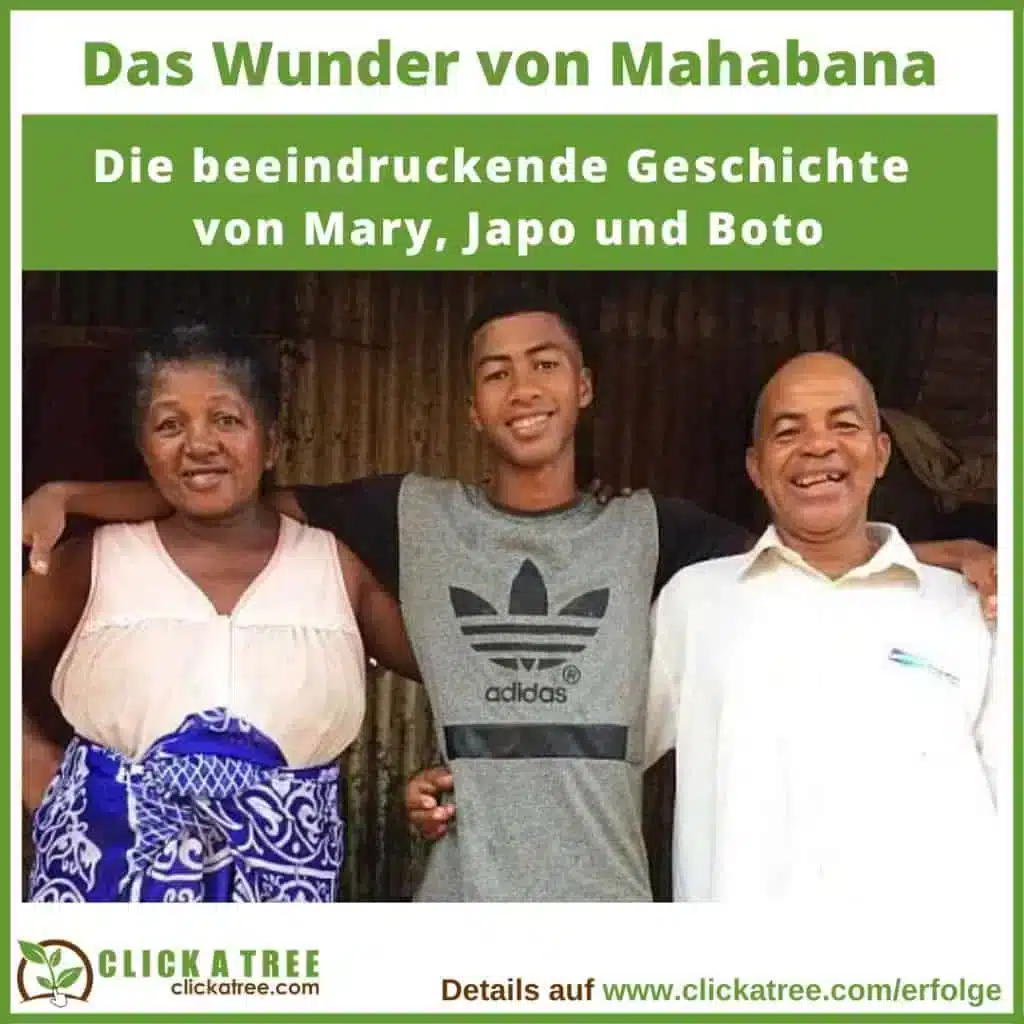The miracle of Mahabana
The story of Boto and Mary
Planting trees makes great things possible. The Miracle of Mahabana – The story of Boto and Mary is a wonderful success story of Click A Tree partners in Madagascar. Read the story to find out how tree planting is changing lives in Madagascar!
A happy ending
Today, Boto and Mary are a happy couple serving drinks in their newly opened coffee shop. Outside, a light breeze gently blows the palm trees back and forth, rustling the leaves. Some birds pay the guests short visits again and again. The coconut shells from yesterday are lying in a heap in the garden and will soon become compost. The air is humid.
Inside, cups and cutlery clatter, friends meet to chat and exchange news. The sun shines through the open windows and the smell of freshly roasted coffee fills the room. A proud owner scurries around to serve his numerous guests.
The store has already become a favorite place in Mahabana. The small town is located on Madagascar’s vast coastline. Boto and Mary’s new life gives them peace of mind, is environmentally friendly and, above all, sets an example for others.
If you asked them if any of this would have been conceivable a few years ago, they would burst out laughing on the spot. Here, in her coffee shop, which didn’t even exist at the time. Boto smiles, “Even in my wildest dreams, I couldn’t have imagined this place.”
Their youngest child, Japo, is currently studying environmental sciences at university. When Boto talks about his son, his eyes light up. He calls himself “the proudest father in the city”.
Its history is remarkable and for a long time this success story was a rarity in the region. Not anymore.
A look back
A few years ago, the situation was very different: Boto and Mary are trapped in debt. They work hard and save where they can, but they can’t get anywhere. It is a vicious circle of poverty from which many unfortunately cannot find a way out.
Boto and Mary live a modest life in Mahabana, a small fishing village on the west coast of Madagascar. A village that would ultimately suffer the same fate as many other neighboring coastal towns.
A lack of environmental awareness and nature conservation would lead to dangerous overfishing. The dwindling population of native marine animals would no longer provide enough food for the community. The residents could no longer provide for themselves.
The sea was the main source of income for the majority of the villagers and this was now disappearing. The devastating loss of fish farms was registered by the inhabitants, but they could not have known what far-reaching consequences this would ultimately have.
Boto and Mary were still desperately trying to provide for their family in the traditional way and continued to spend their days fishing. They had no idea that the continuous deforestation around them was the main reason why the fish were disappearing. Their meager daily yield soon became a problem.
The salt pans
The only other way to earn a living was to extract salt from the nearby salt pans and sell it. However, this was associated with a number of problems, as there was neither an infrastructure nor organized transport to and from the salt works. Without their own means of transportation, they had trouble getting there.
Remarkably, they managed to build a canoe from whatever digen they could find. “Our only blanket served as a sail!” laughs Mary. Today, they joke about the time when the risks of these adventurous trips in a homemade canoe were greater than the benefits.
Because local resources were extremely limited and their main source of food, rice, was difficult to obtain, they skipped more and more meals. Nothing seemed to last long enough and the children were hungry every night.
Her days were bleak, there were no ways out and her health began to deteriorate. They spent their sleepless nights worrying about school fees, food and limited work opportunities – thoughts of medical care were barely allowed.
Last resort
What other option did they have? When Boto had to admit to himself that he could no longer earn a living from fishing and selling salt, he saw only one way to keep himself and his family afloat. Boto was forced to cut down mangrove trees. “It broke my heart. I knew it was wrong even then, but we desperately needed food. I had no other choice.” You can’t hear anyone laughing at these words.
So, like many others desperate to earn money, Boto spent his days involuntarily destroying another valuable ecosystem in his homeland. He received a pittance for the wood he sold, barely enough to cover the family’s daily expenses. He received cents for the brutal backbreaking work. He often had to carry a whole tree on his back and shoulders, a heavy burden that further ruined his health over time.
Japo was still young and lived at home. He wanted nothing more than to be able to go to school. But as great as his wish was, the costs were prohibitive and food was more important.
Boto and Mary weren’t the only ones fighting every day. There were many families in a similar situation who could barely make ends meet. Who knows how long the house of cards of their existence would have lasted without the start of reforestation projects? How many precious habitats would have been destroyed?
When the first people arrived in Madagascar in 2007 with new ideas for reforesting the country, they were met with a great deal of skepticism.
But her vision ensured that the community was changed forever.
Time for change
They began their work with a clear attitude: not only did they create new opportunities to save the village, they also brought sustainability, education and hope for a better future to the community. Her work in Mahabana brought about a positive change. But they had to start with small steps.
Boto and Mary were among the first inhabitants to welcome the new ideas for reforestation in Madagascar and their trust was rewarded.
“I can still remember the exact moment I found out about it,” says Mary. “I was at home, cooking and waiting for Boto to come home from work.
When I saw Jamie and Alissa walking towards our house, I could hardly believe my eyes – we don’t get many visitors in Mahabana. They wanted to come in to “talk to us about a possibility”.
You should have seen me. I was so nervous and the place looked terribly messy! I tried to make tea, clean the chairs and the floor… After so many years, I burnt the rice for the first time!” she sighs.
Reforestation in Madagascar
“They explained their plan to reforest our community,” says Mary. In Mahabana, a small group of 8 workers were hired with the new title of “tree planters”. Boto and Mary were part of this group.
After such a long period of deprivation, the family’s everyday life began to change. Boto had the honor of planting the first mangrove buds.
One of the greatest successes of the project was that those who previously destroyed the natural habitat now did the opposite. Instead of destroying trees and selling the wood, Boto planted them now and created a future.
100,000 mangroves were planted by the 8 employees in the first year alone. Their bodies were no longer tortured by the heavy load and seemingly endless working days. For the first time in their working lives, the tree planters received a fair and constant wage.
Like the entire village, they quickly recognized the benefits of reforesting their home. Of course, many other villagers wanted to be there too.
The miracle of Mahabana
As the success of the project became clear and the funding increased, additional workers were needed. More people from Mahabana were hired, which had the added benefit that fewer villagers were involved in logging.
Meanwhile, the hard work of reforesting their own land fills the villagers with pride. Their function has given the workers a great sense of responsibility for their trees. As fewer families are now dependent on fishing, threatened marine stocks have also been able to recover.
Life in the Malagasy village has changed fundamentally. The quality of life has improved dramatically, and not just for Boto and Mary’s family. The entire community was strengthened.
Around 82 million trees have now been planted. Many employees were able to buy their own land in the city. Not only do they have more participation in their community, they also have more opportunities to work for the preservation of their homeland.
Thanks to a regular, fair income, they can feed themselves well and afford medication, clothing and other everyday items such as mattresses.
It was also possible to build a new school in the village and families can now afford to educate their children. What was once a dangerous spiral of poverty is now a solid framework of education, sustainability and environmental awareness for the future.
The coffee shop
Boto and Mary are happy about their busy coffee shop, meet friends and enjoy their lives. They have escaped the debt trap and now employ their own staff.
They have everything they need to provide for their family and the community in Mahabana. There are even enough savings left over to help others in need.
Japo has now even been able to take up a degree in environmental sciences. This weekend he is coming back to his home country for a short visit.
After experiencing first-hand the impact that reforestation in Madagascar has had on his life, he hopes to one day follow in his parents’ footsteps. He wants to contribute to the future of his country and continue on the path to a bright future.
“It will be great to have him back with us,” admits Boto. Mary winks and adds: “And he can help you spread the compost!”
Boto nods, beaming from ear to ear and pours himself some more coffee. A few years ago, they were still fighting for the survival of their family. Now her youngest son is a well-dressed and educated student. And all because a few good-natured people paid them to plant the trees.
As he sips his coffee and thinks about his son Japo, you can see how his shirt starts to tighten around his chest. Boto is definitely the proudest father in the whole city.
Miracles happen
Stories like the miracle of Mahabana were once very rare, hence the name. But times are changing and a great future lies ahead of us. Miracles happen – and you can help. Planting trees is not complicated. You can have a tree planted in Madagascar right now. Directly online, from your screen.
And you can help change our future without spending a single cent.
Learn how you can plant trees for free by signing up for our newsletter and starting each of your travel bookings with our simple travel tool B’n’Tree.
And don’t forget to tell your friends, family and colleagues about us. Every tree counts!
And now it’s your turn!
Do you have any other ideas to make such miracles possible? What do you think about The Miracle of Mahabana – The Story of Boto and Mary? Leave us your comment on Facebook.

